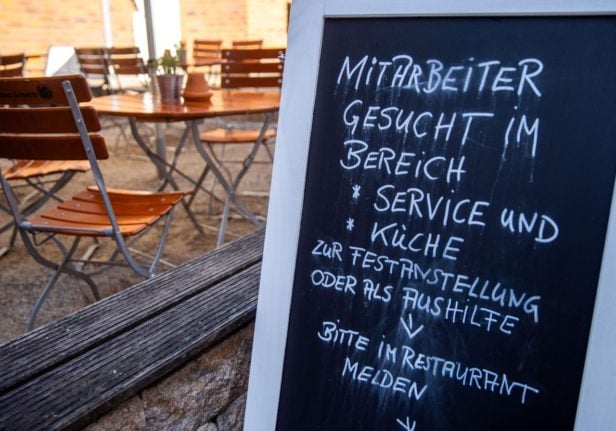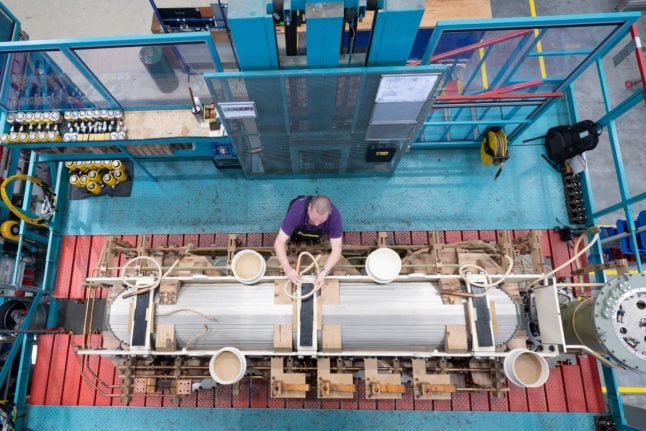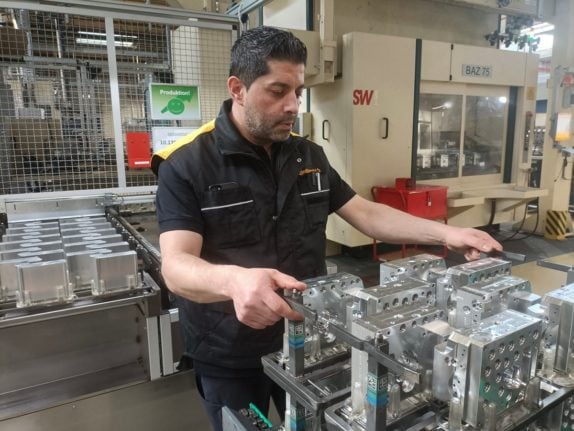Despite the government’s attempts to lure in new workers, the skills gap in Germany appears to be widening.
In 2022, there were 1.3 million jobs offered for skilled or qualified professionals – but according to a recent study by the German Economics Institute (IW), there were only enough qualified professionals to fill around 670,000 of these roles.
That means that for around 630,000 positions – or almost 50 percent of the open positions – there are currently no workers in Germany with the right skills or experience to fill them.
The study from the IW’s Competence Center for Securing Skilled Labour (KOFA) highlights the dizzying scale of the problem that German industry is facing – and the complexities of solving it.
READ ALSO: Why Germany’s skilled worker shortage is greater than ever
While Germany has around 2.5 million jobseekers in the economy, just one million of these are categorised as skilled workers. To make matters worse, the skilled workforce based in certain regions doesn’t always match up to the jobs that need to be filled. In addition, top-tier jobs were almost impossible to fill.
As KOFA’s study revealed, people with the highest level of skill (experts) are in the highest demand, with around 60 percent of these positions remaining unfilled. For the second highest tier of worker – the specialist – half of all jobs had no fitting candidates, while around 40 percent of skilled workers required were missing from the economy.
Although almost all industries are suffering from worker shortages, there are a handful that are being hit particularly hard right now. Here’s a rundown of the main ones.
Education, nursing, health and social care
It’s no secret that Germany is desperate for doctors and nurses to support its clinics and reduce waiting times, and with an aging population, there’s also a worrying dearth of people in the care sector.
Grouped together with teaching and nursery school workers, this group was the most in-demand in Germany last year. According to KOFA’s calculations, there were around 163,000 unfillable positions in these sectors in 2022, representing 60 percent of the jobs on offer.
Many experts believe this is to widen over the coming years, with a potential gap of 200,000 Kita workers and 250,000 teachers by around 2028.
Manufacturing and production
If you’ve got experience in manufacturing, production or the extraction of raw materials (e.g. coal mining), you likely won’t be looking for long before you stumble upon a suitable job in Germany.
After teaching and healthcare, this is the industry that was hit the hardest by the skills worker shortage in 2022. According to KOFA, a whopping 156,000 positions in manufacturing and raw material extraction found no suitable person to fill them last year.
More worryingly, the gap has been widening at an alarming pace. While around a third of skilled positions couldn’t be filled in 2021, this shot up to 53 percent in 2022 – possibly partly due to the post-pandemic recovery.

Law, accounting and management
They don’t often get a look-in when discussing Germany’s skilled worker shortage, but lawyers, bookkeepers, accountants and business consultants are also highly sought after in the workforce.
In this sector of the economy, KOFA traced a shortage of almost 84,000 qualified workers. As in other industries, there is also a pretty clear upwards trend: while the skills gap represented about a quarter of job offers in 2021, this rose to around a third in 2022.
Science and IT
The so-called STEM subjects (science, tech, engineering and maths) are in high demand pretty much wherever you go – and Germany is no exception.
In the areas of science, geography, and IT, companies are desperate to find skilled employees – and especially those with computer science degrees or significant expertise in their field.
In 2022 alone, almost 65,000 job offers were left open due to a lack of appropriately qualified staff – representing 55 percent of the jobs advertised in these fields. This was a significant jump up from the 40 percent of jobs that were left unoccupied in 2021.
READ ALSO: Which sectors are looking to hire in Germany?
Engineering and construction work
Construction was by no means the industry with the highest amount of open positions, but when you look at the skills gap as a proportion of the jobs available in the sector, you can understand the desperation to attract skilled workers.
When it came into office back in 2021, Germany’s traffic light coalition of the Social Democrats (SPD), Greens and Free Democrats (FDP) pledged to build around 400,000 new houses per year to help ease the housing crisis.

However, in 2023, there were around 57,000 skilled positions that couldn’t be filled in the fields of architecture, construction and engineering – representing around 60 percent of the jobs available. In areas like planning and oversight, companies were particularly struggling to find people with the relevant expertise.
A glance at these stats helps to explain how these crises tend to feed into one another – and why the government is likely to build just half of what it set out to this year.
Transport and logistics
There may be a reason those long-distance trains don’t always run on time: the transport sector is also failing to find the staff it needs, and even Deutsche Bahn is affected by the issue.
According to recent news reports, Germany’s state-owned rail operator wants to hire a good 25,000 new staff this year – but is struggling the find people with the qualifications it needs.
That’s backed up by KOFA’s stats for 2022, which show that a good 45,000 positions in the branches of transport, security and logistics couldn’t be filled last year – representing about a third of the workers it needs.
READ ALSO: Five well-paid jobs in Germany that nobody wants to do
Tourism and hospitality
Germany’s tourism and hospitality sector has appeared to have bounced back with a vengeance since the pandemic, but for the owners of businesses, there’s a downside. The economic recovery has left them grasping around for the workers they need, and they are clearly struggling to find them.
In KOFA’s analysis, hospitality, trade, distribution and tourism were all grouped together in one category. They found that the industry was missing around a third of the workers it needs to operate, with around 44,000 positions left unfilled.
Last summer, the worker shortage became all too noticeable as short staffing led to chaos at airports around Germany. At the time, the government responded by launching a special visa for temporary workers from Turkey, and it is hoping that new immigration reforms could help solve the problem in the long term.
READ ALSO: Will immigration reform be enough to combat Germany’s worker shortage?

Where are the shortages less severe?
So much for the workers in high demand. Are there any industries that aren’t quite so desperate for skilled workers?
Well, it’s worth noting that pretty much all industries are having a hard time filling jobs at the moment. Germany has almost full employment, and those who are unemployed either can’t work or don’t have the skills required to fill the jobs in their area.
That said, the skills gap in industries like art, humanities, media and the social sciences is far less severe than it is in areas like technology, law or engineering. Here, almost 10,000 positions couldn’t be filled last year, representing around 16 percent of the total jobs available.
Another area with fewer open positions was agriculture, farming, gardening and forestry. The skilled worker shortage in these sectors went up to 6,100 in 2022 – far less than in other industries. However, this figure represents almost half of all of the open positions available in these industries last year, which suggests that the skills gap is still having a major impact even here.



 Please whitelist us to continue reading.
Please whitelist us to continue reading.
Member comments